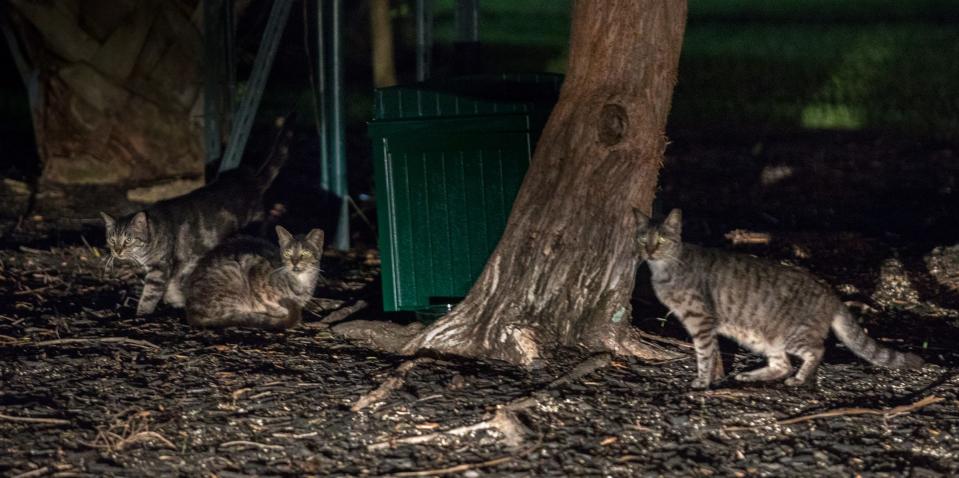Palm Beach residents urged to protect pets from coyotes

A non-profit organization that cares for Palm Beach's community cat population is raising concerns about the growing presence of coyotes on the island.
Palm Beach Island Cats, which feeds and provides water and medical care for the island's cats, is urging residents to protect their pets from coyotes.
David Leavitt, president of Palm Beach Island Cats, said coyotes first appeared several years ago on the island's South End, and have slowly migrated north.
A species of canine that rarely threatens people, coyotes are known to prey on domestic pets, according to the Florida Fish and Wildlife Conservation Commission.
The canines, which typically weigh between 15 and 30 pounds, are opportunistic feeders and predators that are suspected to have been involved in the disappearance of about 30 community cats during the latter part of last year, Leavitt said.
More:Palm Beach coyotes are being trapped, but who wants them gone is a mystery
A friend of Leavitt's recently lost a 15-year-old cat to a coyote, while coyote sightings have prompted a half-dozen calls to Palm Beach Police during the past two years, department spokesperson Capt. William Rothrock said.
Leavitt said it is difficult to determine how many coyotes are roaming the island.
"This is something new," he said of the challenges posed by coyotes. "I've been coming to Palm Beach for 66 years now, and there have always been creatures in yards that you don't see, and you can trap them. We have foxes, raccoons, possums and some skunks. They've never really caused a problem. A fox once in awhile would take a kitten, and no dogs were getting attacked. Now, we've had dogs on leashes targeted by coyotes. It's a big change."
Coyotes, which are native to North America and found throughout Florida, eat whatever is available, including fruits, nuts, seeds, dead animals, rodents, garbage and pet food, according to a brochure circulated by Palm Beach Police.
While not part of their normal diet, small, unmonitored household pets also can become prey.
Leavitt, whose organization stocks and monitors 32 feeding stations throughout the island and has worked to reduce its community cat population from 770 to about 230, said residents must be vigilant in protecting their pets from coyotes.

He recommends moving all pet food indoors at night, cleaning up fallen fruit and other food, securing garbage cans, and walking pets on a short leash that is less than 6 feet, especially at night, dusk or dawn.
Cats should also be brought inside overnight, Leavitt said.
"I don't want tragedies," he said. "People are very attached to their pets. We want them to keep them safe. If it becomes a problem, people are going to have to walk with a tennis racket or golf club."
Removing coyotes for the purpose of eradicating them is expensive, inhumane and ineffective, according to The Florida Fish and Wildlife Conservation Commission. However, there are effective ways to deter a coyote if one is lingering nearby.
Hazing, which is recommended by the FWC, includes yelling, waving and stomping; using noisemakers; throwing sticks, small rocks or tennis balls toward the coyote; and spraying problem coyotes with a garden hose or water gun.
Leavitt also scares coyotes away by using paint guns, pepper balls and a device called a scarecrow, which is a motion detector sprinkler system that shoots water or other substances.
Hazing helps disturb a coyote's sense of security, Leavitt said, making it less likely that it would learn to tolerate human presence.
"Usually coyotes are nocturnal, but in places where they've become habituated to people, you can see them on the golf course at any time," he said. "That's the worst possible case, and that's what we don't want to happen. They have become habituated to people, and they're not afraid of them."
In 1983, coyotes were reported in just 18 Florida counties, mostly in the Panhandle, according to FWC. By 1990, they were noted in 48. Today, they're in all 67.
As coyote concerns continue to rise in Palm Beach, Leavitt said he will address the issue at the Town Council's regular meeting Tuesday.
"I plan to give a rundown on where we stand, what can happen and what we need to do," he said.
Palm Beach Police encourages residents to reach out if they observe unusual coyote behavior, such as approaching people, stalking pets, chasing joggers or attacking leashed pets. Contact the department's non-emergency at 561-838-5454, or emergency at 911.
For more information on coyotes, visit the FWC's website at https://myfwc.com.
Jodie Wagner is a journalist at the Palm Beach Daily News, part of the USA TODAY Florida Network. You can reach her at jwagner@pbdailynews.com. Help support our journalism. Subscribe today.
This article originally appeared on Palm Beach Daily News: Palm Beach residents urged to protect pets from threat of coyotes

